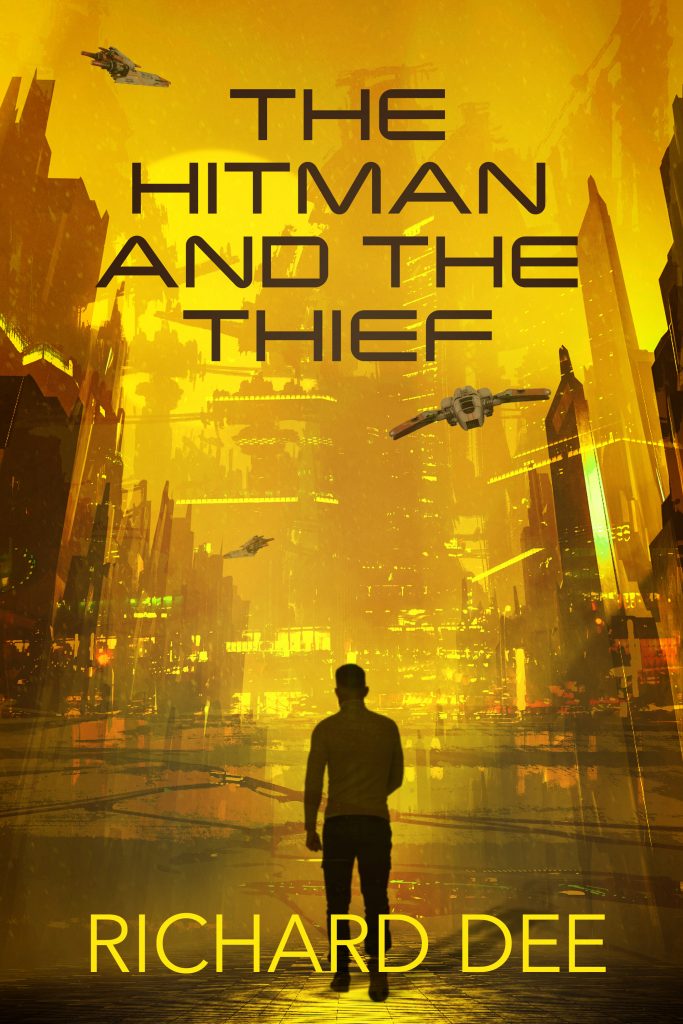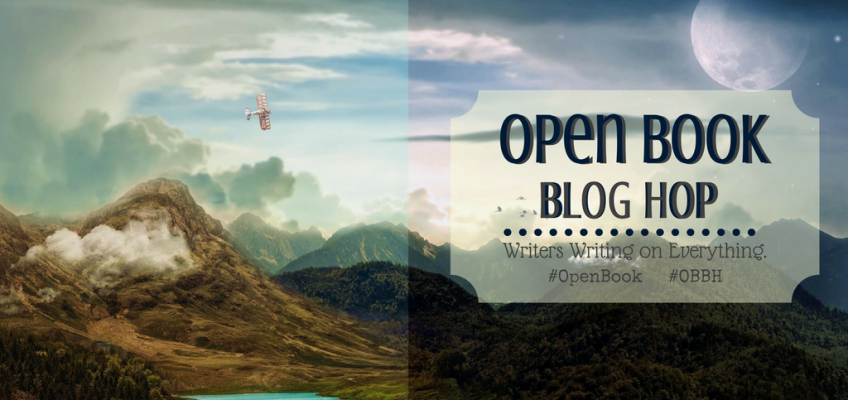Welcome back to another blog hop, with #OpenBook. Here’s this week’s prompt.
Do you embrace dialog or narrate your way around it? Why?
I’m a big fan of dialogue, it can be used for so much more than conversation.
A lot of people would say that dialogue is really only used to move the action along. Backstory and scene setting is normally seen as the preserve of narration, or as I prefer to think of it, information dumping.
I’m not a big fan of the information dump. While I can see the need to fill in the backstory and provide information, my eyes glaze over when the book I’m reading turns into an article from an encyclopaedia. All that information, in one hit! The reader, if they can be bothered to stick with it, will never remember it all. Just think back to school, how many times did you need to be told something to make it lodge in your mind?
How can we make it easier to digest? By imparting it in a way that either makes it interesting, part of the story or in such a way that the reader doesn’t even notice what they’re being told.
Rather than by just giving it all out in one go, I like to use it as part of the story. By turning the backstory into dialogue. It makes it more memorable. Not only that; it then performs a double function. It gives us the information in a more digestible form and it can give us an insight into the character (or the character’s character). It can also be drip-fed, to avoid overloading the reader with too much, too soon. Vital clues or hints can also be inserted at this point.
I used to hold World-Building workshops at literary events, in fact I wrote a book on it. This paragraph was part of the presentation, it illustrated how to impart backstory as a conversation during an action sequence,

The shot rang out and concrete was chipped by my head.
“Come on,” gasped Lydia, grabbing my arm, “run!”
I was dragged down the street, in and out of the shadows cast by the flickering lights, “keep your head down, Dan,” she said.
“It’s just like on Gallix,” I managed to wheeze as, bent double; I followed her around a corner. Out of sight for a second, we dodged into a dark alleyway. There were no more shots, but we could hear running feet and shouts.
“When we had to get away from Kalindra and her boys,” she gasped, while I tried to fill my lungs. “I had to save you then.”
“I thought that I saved you?” I replied.
“In your dreams,” she laughed, punching my shoulder. We stood in the dark and tried to get our breath back, shrinking into the darkness as two men, guns held in front of them, ran past us. The blatant show of weapons reminded me that I was out of my depth here, far from my old stomping ground. They probably had the local law in their pockets, we were the outsiders.
I was getting angrier and angrier with Fliss Bauer, back on Gallix. ‘It’ll be easy,’ she had said, ‘just get in and do this for me, it’ll wipe your slates clean’.
And we’d believed her.

In 220 words, I’ve introduced two characters, shown that they have a solid relationship and hinted at a past life of dubious activities. I’ve also (I hope) got the reader wondering what they’ve done to deserve being shot at, why their slates needed wiping clean and why the shooters are so casual about being seen.
I think explaining the situation in that way is a lot more exciting than information dumping about Dan and Lydia’s reasons for being where they are.
Incidentally, this short piece, written in less than ten minutes, was the idea that sparked my novel The Hitman and the Thief.

Assassination can be a messy business, especially if you’re having a bad day.
Dan Jones is the ultimate problem solver, the hitman for crime boss Fliss Bauer.
Fliss has a rival, Kalindra Dallin. She runs a particularly unpleasant planet. Dan is told to arrange her demise. It’s just another job; until a random event means that it all goes horribly wrong.
To save his skin, Dan is forced to try again, only this time he has to work with a partner. He doesn’t want to but it’s the only chance he’s going to get; if he wants to put things right.
Can the hitman and the thief get the job done, more importantly, can they keep each other alive?
The same method can also be used by making your character have a conversation in their mind. You can also impart information in moments of introspection, or even by having internal conversations with absent friends.
While I’m quite happy to work with dialogue or narration, I think the value of each and its appropriateness (is that even a word?) depends on the style of the work. Action and Adventure tales are probably more suited to dialogue, while my Steampunk stories are written and styled in a way that lends itself more to narration.
The trick is to mix it up, so that however you impart the tale, it’s never boring.
Let me know what you think about this week’s subject.
I’d love to get your comments, please leave them below. While you’re here, why not take a look around? There are some freebies and lots more content, about me, my writing and everything else that I do. You can join my newsletter for a free novella and more news by clicking this link.
Now see what the other blogs in this hop have to say by clicking below.
Check out the other great blogs here.
While you’re here, you might be interested in this Bookfunnel promotion.

![]()



Chris L Adams
Great topic, Richard. It’s one I’ve struggled with myself. Exactly as you stated, I now try to convey backstory in dialogue as much as possible because really does make it more interesting. And as you said, do so in drip-fashion versus a deluge.
Richard Dee
I’ve always liked presenting information in a different way. I remember the difference between being taught at school by theorists and at nautical college, by people who had actually done the job and could give you the knowledge dressed up as a practical example. I know which I found easiest to retain.
Stevie Turner
Yes, the info dump is to be avoided at all costs. As you say, much better to turn it into dialogue.
Richard Dee
I think you get more bang for your buck with a conversation.
Chris L Adams
Absolutely, because then rather than the neutral tone of the narrator you can throw in the speakers’ personality traits which can really jazz it up.
Richard Dee
And that makes it more memorable, as well as telling you about the character, two jobs done at once.
Stevie Turner
Yes indeed.
Richard Dee
I’m all for getting value, so to get two useful things from one sentence is music to my ears.
phil huston
I prefer my info dumps from characters, too. And I hate freaking semicolons. I realize that’s a strong word, but right in the middle of dialog and action? Your editor owes you fifty cents back for that one. And things, like replied or asked, are always redundant.
I managed to wheeze. (modifies dialog) Bent double, I followed her around a corner. Or -bent double I wheezed “dialog”… Then there’s Lydia gasped, grabbed my arm (two EDs, no soft verb forms intermingled). You could drop this by 19 words easy and make it go BAM. Whatever you’re paying your editor, it’s too much. You have a huge catalog that if one were to take a line trimmer to it, you’d rock.
Richard Dee
In their defence, my editor has never seen this bit. I wrote it on the fly to illustrate a point. Not that I ever understood grammar and where to put a semi-colon; you have to make allowances, I failed English at school, not once but twice! I learned from another blogger today that you shouldn’t start a novel with dialogue. I did it in Life and Other Dreams cos I thought it was a good idea, still do.
P.J. Maclayne
I recently read the first chapter of someone’s WIP. The first 4 or 5 pages were pure info dump. (shudder) I made a couple of suggestions on how to change it. Mostly through the use of dialogue.
Richard Dee
I rewrote my first novel to remove the info dump, once I had learned better.
Chris L Adams
Much of the literature I love from the golden age of pulpdom did not use dialogue to pass on needed information, but was instead told from the first person POV or from the God view and flowed deeply with purple prose. I read so much of it as a young lad that it is a forced effort to turn it into dialogue now. What do you do when there is but one character? Have him talk to himself I guess. Take this example of one of H. P. Lovecraft’s dream-cycle stories. I love these better than his horror and Cthulhu efforts although they’re not as famous.
******************
Three times Randolph Carter dreamed of the marvellous city, and three times was he snatched away while still he paused on the high terrace above it. All golden and lovely it blazed in the sunset, with walls, temples, colonnades, and arched bridges of veined marble, silver-basined fountains of prismatic spray in broad squares and perfumed gardens, and wide streets marching between delicate trees and blossom-laden urns and ivory statues in gleaming rows; while on steep northward slopes climbed tiers of red roofs and old peaked gables harbouring little lanes of grassy cobbles. It was a fever of the gods; a fanfare of supernal trumpets and a clash of immortal cymbals. Mystery hung about it as clouds about a fabulous unvisited mountain; and as Carter stood breathless and expectant on that balustraded parapet there swept up to him the poignancy and suspense of almost-vanished memory, the pain of lost things, and the maddening need to place again what once had an awesome and momentous place.
Richard Dee
That is truly beautiful.
Chris L Adams
I love it, Richard. Dream-Quest is my favorite piece by HPL. He developed an affinity for that type of writing after seeing Lord Dunsany speak and afterward becoming enamored of Dunsany’s writings–which is easy to do, as they’re truly wonderful.
Lela Markham
I’m a major fan of dialogue, to the point where I sometimes need to dial it back. It becomes a wall of words that needs some relief. But most writers report the other problem, so all I can say is “variety is the spice of life … and writing” and we should constantly be in the process of making ourselves better and more varied writers.
Richard Dee
That’s the goal, my style has developed so much over the years (and novels).
Lyndell Williams
I flip past info dumps, whether it’s backstory or describing the character’s surroundings. I think those died out with the Romanticism authors. I need to grab your world-building book. I’m working on a post-apocalyptic time travel romance.
Richard Dee
Good luck with that project, it sounds like it could be a lot of fun, to write and to read. Also, thanks for your interest in my guide. You can find it at http://mybook.to/Creating-a-Scifi-World
Amy Mller
And we’d believe her. Love it! You had great points. It’s a great way to share backstory without bogging the story down. That’s one of the first lessons I learned.
Richard Dee
Thanks, I’m glad you enjoyed it and hope that people found it thought-provoking.